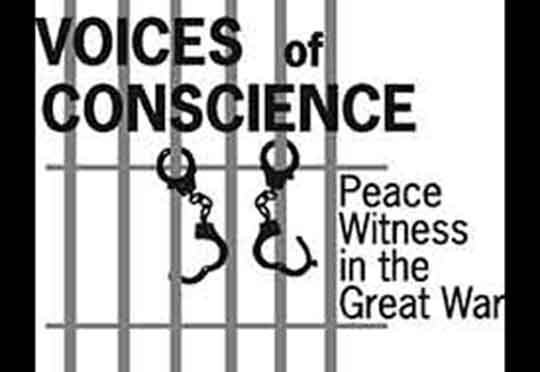 In 2017, the United States marked 100 years since entering the World War I conflict. As Americans commemorated this historical landmark, Kauffman Museum of Bethel College in Kansas introduced a national traveling exhibit to help keep peace witness in mind.
In 2017, the United States marked 100 years since entering the World War I conflict. As Americans commemorated this historical landmark, Kauffman Museum of Bethel College in Kansas introduced a national traveling exhibit to help keep peace witness in mind.
Elizabethtown College is the next stop on this national tour, showcasing the approximately 1,000-square-foot exhibit, titled “Voices of Conscience: Peace Witness in the Great War.”
The traveling exhibit lifts up the prophetic insights and the personal courage of WWI peace protesters and suggests parallels to the culture of war and violence in our world today. This witness included men and women, religious believers and secular humanitarians, political protesters and sectarian separatists. They resisted U.S. involvement in the war, the enactment of military conscription, the war bond drives, and the denial of freedom of speech under the Espionage and Sedition Acts. For this resistance many suffered community humiliation, federal imprisonment and mob violence at the hands of a war-crusading American public.
Organized in 10 themes that encourage exploration and reflection, the modules surround a recreation of an Alcatraz Prison cell, the site where Hutterite conscientious objectors were punished for refusing military participation. Text and quotes provide interpretation and raise provocative questions for viewers while large-scale graphics and photo-murals immerse visitors in the historical experience of witnessing for peace during “total war.”
The exhibit opens at 7:45 a.m. Friday, April 13, at the College’s High Library, and continues during regular library hours through Wednesday, June 2.
Two evening events also coincide with the traveling exhibit.
An opening reception—with desserts and time to view the exhibit—takes place from 6 to 7 p.m. Thursday, April 19, on the second level of the library with an interfaith peace panel following at 7 p.m. in the College’s Gibble Auditorium.
The interfaith panel reflects on religious perspectives on peace and conflict. Participants from four faith traditions (Hinduism, Islam, Christianity and Judaism) discuss what their own religion says about war and their personal faith convictions about war.
In addition, Steven Nolt, senior scholar of the College’s Young Center for Anabaptist and Pietist Studies, presents “World War I and Lancaster Peace Churches,” at 7 p.m. Thursday April 26, in Hoover 110.
He will talk about ways that Lancaster’s peace church people experienced wartime pressures, sought to explain their convictions to their neighbors and to the government, and struggled to know how best to help those suffering from the war’s effects.


Thank you for bringing this enlightening program to Elizabethtown College.
Interestingly, my husband, Herb Smith, and I are both graduates of Elizabethtown College, but we live near Bethel College in Newton, Kansas. We are located in McPherson, KS.
Herb still teaches in the Religion Department at McPherson College, and I am professor emerita of English and Teacher Education. Herb’s schedule is only half-time now, since he is semi-retired.